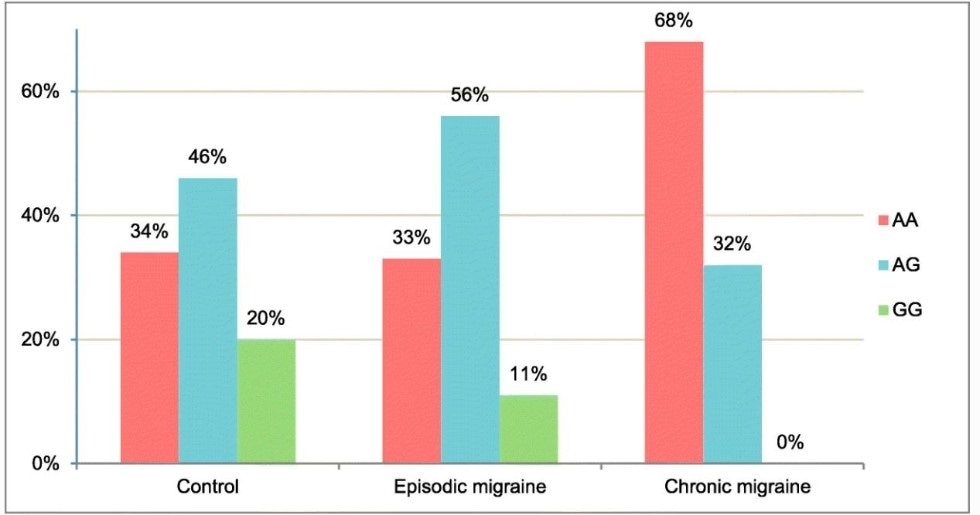According to current estimates, a migraine is a highly prevalent illness and around 15% of the global population is estimated to suffer from this ailment at one time or another.

TRPV1 1911A>G SNP distribution in the control group and EM and CM patients. CM group revealed high frequency of AA and missing GG genotype. Image Credit: Kazan Federal University.
In Russia alone, the ratio reaches as high as 20%. Present-day diagnostics and treatment approaches are stringently clinical, that is, they are based on a patient’s complaints.
The new study was performed by Neurobiology Lab and Gene and Cell Technologies Lab at Kazan Federal University. The researchers had searched for genetic markers of migraine for approximately two years. Collaborators from Saint-Petersburg and Kazan State Medical University also made a significant contribution to the study.
Chronic migraine is a much more serious disease than episodic migraine. Migraine is prone to becoming a chronic syndrome, so it’s important to detect those who may become afflicted in the risk groups with episodic migraines. Such patients may be assigned prevention medications to avoid chronic migraine. Thanks to this particular research, we found genetic factors protecting from the chronification of migraines.”
Aliya Yakubova, Neurologist and Junior Research Associate, Kazan Federal University
For the testing, a total of 46 patients with migraine and 50 patients without migraine were chosen. These patients donated blood for DNA sequencing. During the sequencing process, the researchers established polymorphisms in the pain receptor called TRPV1. In this example, the substitution of nucleotide A by nucleotide G causes a modification in amino acids.
At this phase, the pilot studies have been concluded. The selection procedure will be continued, and patients suffering from episodic or chronic migraine can participate.
We will test the results on a larger selection of individuals. If our takeaways stand ground, we’d like to introduce them into clinical practice. If a patient has genotypes AA or AG, which don’t prevent migraine chronicity, they can receive long-term prevention therapies. If they have the GG genotype, chronicity is unlikely, and only symptomatic therapy can be prescribed.”
Aliya Yakubova, Neurologist and Junior Research Associate, Kazan Federal University
The study helped identify considerable variations in polymorphisms in people with episodic versus chronic migraine. This implies that some level of genetic predisposition prevails, and that both prevention and risk factors of chronicity exist for all the three genotypes. The patenting procedure for the new method is presently ongoing.
Source:
Journal reference:
Yakubova, A., et al. (2020) Searching for Predictors of Migraine Chronification: a Pilot Study of 1911A>G Polymorphism of TRPV1 Gene in Episodic Versus Chronic Migraine. Journal of Molecular Neuroscience. doi.org/10.1007/s12031-020-01683-9.